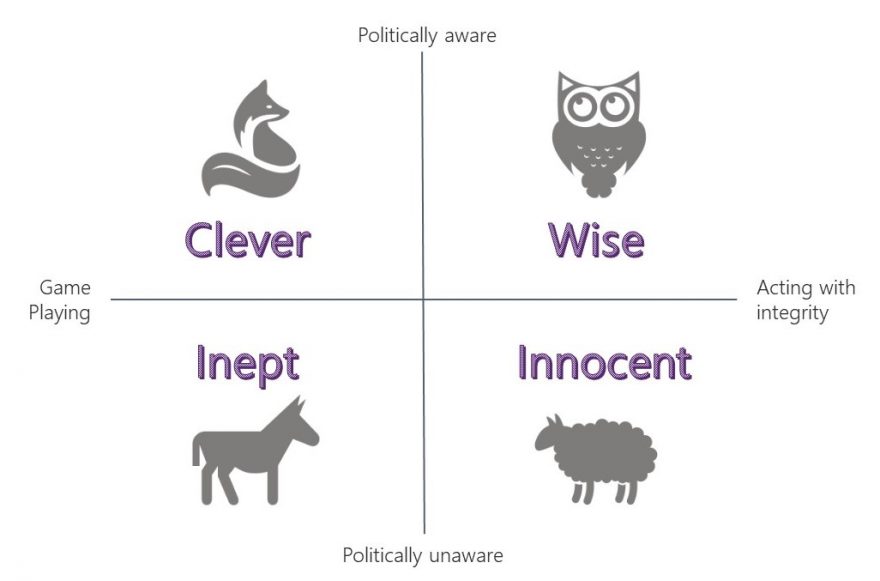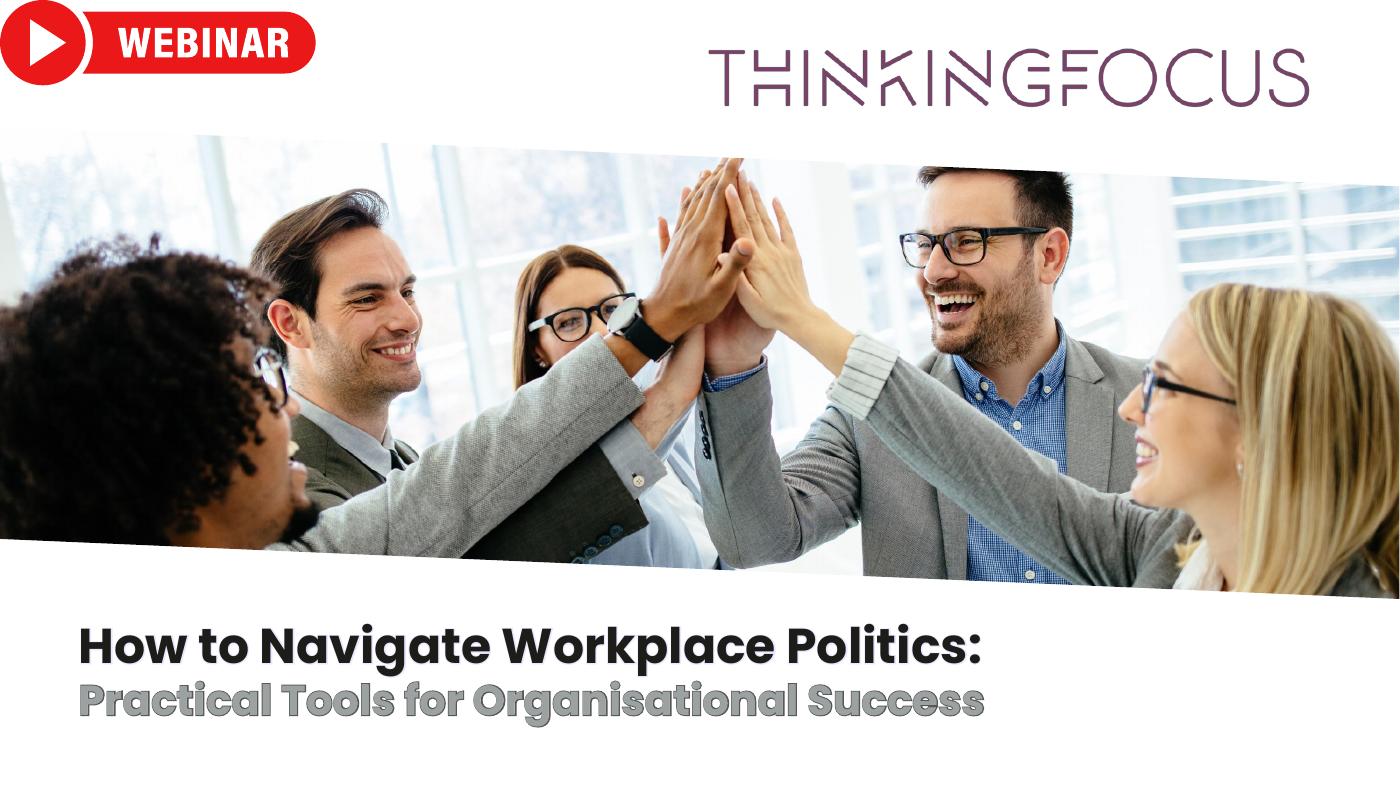People very rarely like to talk about politics in the workplace. Perhaps we don’t even want to admit that it’s a thing. But the fact is that everyone in your organisation is acting in a political way.
That’s because workplace politics is about how we behave towards each other and our motivations. It’s all about power, authority, and relationships. Power can come from different sources: It could be based on someone’s role, experience, knowledge, professional or personal network, or charisma.
The term ‘office politics’ usually has negative connotations, but is it really always a bad thing?
The answer is no, but it depends on the politics involved. Good politics is about doing things correctly and fairly in the interest of the group and the overall vision, whereas bad politics is about acting out of self-interest. Particularly during the process of change, behaviour needs to be driven by politics—there needs to be somebody who can engage people and take them on a journey. That’s what change leadership is all about.
Awareness is key as a manager of people who will behave according to their own politics. Change leaders often involve people for the wrong reasons. It’s easy to make the mistake of involving someone because of their position or their relationship with you.
Recognising the political motivations of your people will help you assign useful, productive roles to them that utilise their skills and experience and help achieve a goal for the overall good. It’s vital for those times when you need to rely on people who can lead and get things done for the good of the organisation, its people and its goals. So, what political game are your people playing? A useful way of identifying the political style and motivations of your team members is using the model developed by Simon Baddeley and Kim James, as shown in this diagram:

It splits people into one of four categories: sheep, donkeys, owls and foxes. Once you understand which category a person fits into, you’ll know how they will approach things, and what kind of role they should take on a project. It can be particularly helpful when implementing change and thinking about the type of people you can rely on to lead it successfully.
So, what characteristics does each animal show, and what does this mean for their role in the team?
Sheep are politically naïve but act in the group’s interest, because they think it’s the right thing for the organisation and the people. They are loyal and industrious but need to be led.
Donkeys, like sheep, are politically naïve – but the difference is that they act out of self-interest.
Owls are politically aware of the situation and the environment, but ask how to do things for the overarching goal and the people. They are loyal to the organisation, possess integrity, and are respected by colleagues.
Foxes are also politically aware but act out of self-interest, putting themselves before others and even before the organisation. But there’s no doubt they can make things happen, even though they do it for their benefit. If you are prepared to manage them closely, there’s nothing wrong with sending a wily fox into a difficult situation. Foxes are useful, but make sure you know their motivation, how they are likely to behave and the opportunities they may want to seize for themselves.
Dealing with these different personalities as a manager can be difficult. Still, the first step is to recognise who fits into each category, understand who should be placed in a key role for a specific project, and who needs to be carefully managed. Owls are clearly prime candidates, although they may as well be unicorns as they are so hard to find! Perhaps you may like or require the ambition and drive of foxes.
The role of a leader is not to get lost in politics or to turn a fox into an owl. It’s about recognising which political ‘animals’ are in your team, and being aware of how best to manage them.
Baddeley, S. and James, K., 1987. Owl, fox, donkey or sheep: Political skills for managers. Management Education and Development, 18(1), pp.3-19.
Your Practical Toolkit for Navigating Workplace Politics
Something Practical for you to do – Part 1:
Think about others; look at your key stakeholders: your boss, coworkers, peers, other teams, suppliers, and customers.
How do you see their motivation?
- Are they focused on themselves and their own self-interest?
- Are they focused on the outcomes of the group?
How politically aware are they?
- Are they astute? Do they have a good understanding of what’s going on?
- Do they look for cooperation and coalition?
- How connected are they to key stakeholders?
This will help you to identify the political behaviour of your stakeholders.
What do you do with a Fox?
Think about the strengths of a Fox, someone who not just knows how to get things done; they actually get it done. Where could you use some focus, attention and single-minded action? But beware of how they play the game and put strategies in place to mitigate their game-playing and self-interest.
What do you do with Owl?
Utilise the owl’s strengths, lean into its wisdom, and leverage its mentorship. Draw from its big-picture understanding and connectedness to help overcome obstacles and advance the collective goals.
How do you handle a Donkey?
Donkeys love attention, but not for the right reasons; they ‘kick off’ without any sense of what is happening or who is around them. So beware, don’t feed that attention-seeking behaviour, and don’t reward their bad behaviour. However, do document what you agree and establish an audit trail to go back on.
How do you handle a Sheep?
The sheep are looking for you to value their contribution. Don’t take them for granted, and definitely avoid sidelining them or assuming they’ll just go along with it—they’ll just come along. They may come along, but if not respected, they will bleat, moan, and drain energy.
Something Practical for you to do – Part 2:
Now think about you: how good a politician are you?
Before you fall for delusionary self-assessment, like everyone else, you will be guilty of seeing yourself as perhaps more astute than you really are. Beware of confirmation bias, where we look to support our view and ignore areas where in our heart of hearts we know we could be better. So, to overcome this, invite two or three people you trust to answer these two questions for you. Pick those who can be objective and will give honest feedback.
- How politically aware is [insert your name]?
- Is [insert your name] motivated by their own agenda or that of the group?
Where do they see you? A game-playing fox or a wise owl? A troublesome donkey or a compliant sheep waiting to be told?
The reality is that we all could do with sharpening our political skills; here are four things that will help you to level up your political awareness:
Know
Observe & Seek out Trends
- What are the issues that get raised again and again?
- Create a network with different perspectives in your industry
Speak
Sound more political
- Focus on the main points as succinctly as possible
- Communicate against overarching topics, not tactical details
Think
Ask the Tough Questions
- What does success really look like (now and in the future)? – What are the signs of failure?
- How does what I am working on support the broader organisational goals?
Act
Time to Think – Embrace Conflict
- Spend more time on the important (and less time on the urgent)
- Embrace challenge – Focus on the issue, not the personalities



